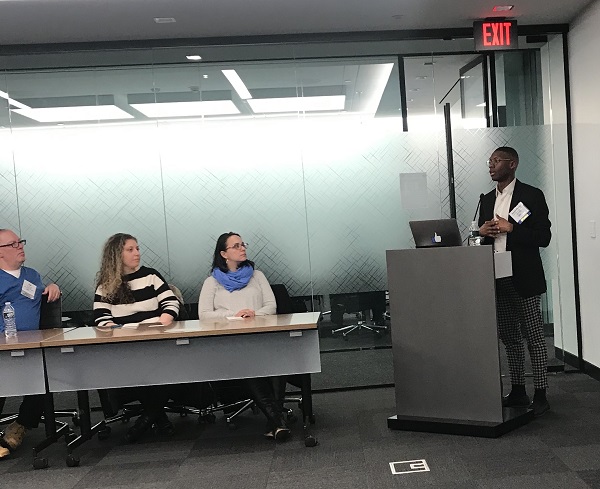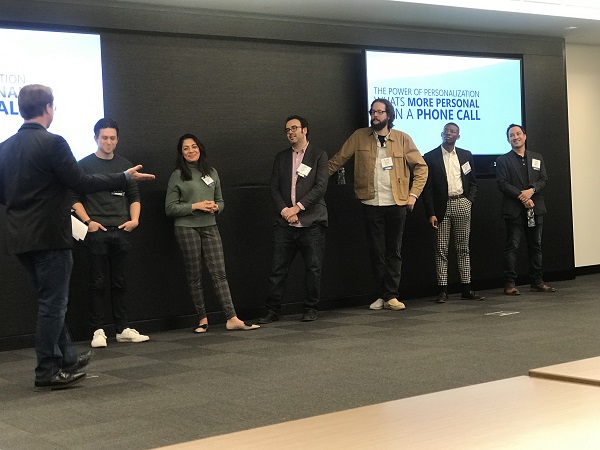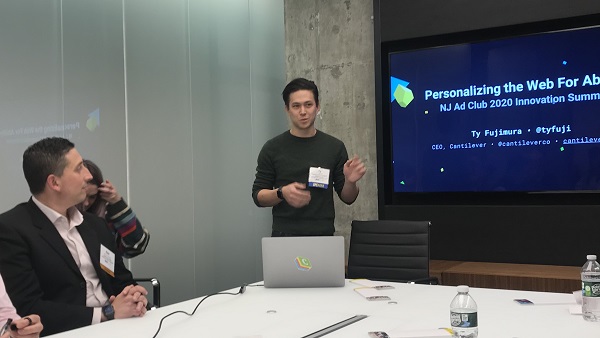NJ Ad Club Innovation Summit Lights Fuse on New Ideas
Ty Fujimura looks at constructing websites a little differently from the way most web developers do.
He imagines that he’s visually impaired.
“If you have great eyesight, and you can use a mouse, and you speak English and you have a great internet connection, most sites on the internet are going to work quite well for you. But let’s say you have visual impairment, or you have a broken hand or you have epilepsy, holding a baby while in the sun. It’s going to be challenging,” said Fujimura, who’s the founder and CEO of Cantilever Web Design and Development (Fair Lawn).
But most people outside his line of work don’t know about those challenges. That’s why Peter Field, principal of Skylight Arts Productions/Skylight Agency Partnerships), was happy to invite Fujimura to join the lineup of speakers at this year’s NJ Ad Club Innovation Summit, held on February 27 at Bell Works, in Holmdel. Field was chair of the event.
“[Web accessibility] is so important, but still so under-addressed in the marketplace,” Field said.
“It certainly was my single greatest area of personal learning in terms of this year’s [conference] content, and it’s highlighted a huge blind spot that I’m shocked to find in my own career in digital media and advertising,’’ he added.
“I stepped in to attend most of Ty’s second session for the evening and joined an engaged conversation with designers and web developers who were considering how web accessibility could be standardized in a way that would make it as integrated into new projects as responsive web design and development has become. That’s an important conversation — and there were some sharp minds in that room thinking through how it could be done.”
Fujimura noted that web accessibility is a crucial issue in the industry. “I think a lot of people are realizing that not only do they want to make sites accessible to avoid legal consequences or bad PR, but that accessible sites just tend to be more effective overall. At Cantilever we have been working hard to improve our accessibility practice, and it has made us much more conscientious and thoughtful about our work in general,” he said after the event.
“I expected this to be a niche topic [at the summit], but people in lots of different roles and industries took part and seemed to get a lot out of the discussion. I think marketers have just been unaware that their websites may have accidentally excluded people in the past, and now that awareness is higher, they are eager to do something about it,” he said.
The demand for web accessibility has grown over the last five years. “Many of our sales leads now request information on our accessibility practices and standards, which used to be rare,” he said. “It’s great to see more attention on the topic. Much of the concern we hear in the business community is trying to avoid getting sued — that really pricks people’s ears up — and that’s not the main reason to make your site accessible. But it is a good way to start the conversation, at least.”
Fujimura was one of six speakers to address some of the 150 people on the theme of the 2020 summit: “The Power of Personalization.”

Speakers also included Kevin Pierre Satterfield, client solutions manager with Facebook’s Global Business Group. He spoke about “The Rise of Conversational Commerce.”
During his session, Satterfield asked, “Why do people not come back after that initial purchase? It’s that their history was not stored. What does that tell you? It tells you if the data and the information that consumers have given to you is not being leveraged and used in a way that’s going enhance their experience and make it better, you are not servicing them in a way they want to be serviced.

“It’s their online experience. They have already shown an interest and bought an item. But how do you make the experience better. You always want to keep in the back of your mind how to create the best experience for the consumer because that’s what’s going to keep them coming back. People are no longer looking for products. Products should be looking for people,” he said.
Also speaking was Carlos Almonte, the executive director of global marketing at Techstars (Boulder, Colo.); Mitali Banerjee, strategy director for Wunderman Thompson (New York); Adam Hirsch, practice leader, digital experience at W20 (New York); and Mike Edwards, founder and lead technologist at rich|strange (Jersey City), serving clients such as Twitter, Samsung, Gensler, AT&T and Sub Rosa.
“The goal of this event is to light a fuse on new ideas. We have so many innovative thoughts happening right here in New Jersey, but for so long we have been told you have to cross the river in one direction or another direction to have a conversation, but that’s not true,” said Field.
“We’ve heard people talk about leaving with new thoughts on a more purposeful approach to personalization in Mitali Banerjee’s session; a more pragmatic approach to personalization in Adam Hirsch’s session; a more engaging approach to personalization in Mike Edwards’ session; a more customer-centric approach to personalization in Kevin Satterfield’s session; and a more equitably accessible approach to personalization in Ty Fujimura’s session; and digging into the hard, but shared truths of internal company roadblocks to innovation that stand in the way of effective personalization in Carlos Almonte’s session. People have said that the conversations gave them thoughts they could take right into their next work week, which is exactly what we’re aiming for each year,” he said.
Fujimura noted that there are opportunities to reach people. In the United States alone, there are about 7.5 million adults who are visually impaired, and 1.5 million who are legally blind, as well as 57 million who have a disability.
“We see accessibility as a way to personalize digital experiences. We are thinking about how we can make these experiences better,” he said. “What is accessibility? It is the practice of making sure that anyone in any circumstances can use your product.”


